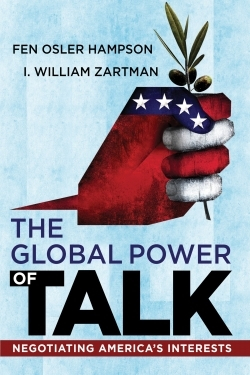The Global Power of Talk
Negotiating America's Interests
Diplomacy requires new talking skills, creativity, and, most important, the ability of leaders to persuade their counterparts to support common goals in a post-Cold War world fraught with terrorism, nuclear proliferation, declining resources, and ethnic and religious wars. “Talk power,” claim the authors, as opposed to “gun power,” is a much more effective negotiating tool for promoting stable relations between nations and among factions fighting within them. Hampson, Chancellor’s Professor and Director of the Norman Paterson School of International Affairs at Carleton University and the author or co-author of nine books, and Zartman, Jacob Blaustien Professor Emeritus at the School of Advanced International Studies at Johns Hopkins University and the author of several works on negotiations, present a convincing case for negotiation as the most viable strategy for ending and preventing conflicts.
The book consists of descriptions of “talk power” and its successful, and at times tenuous, application throughout the Middle East, Africa, Iran, Sudan, Syria, North Korea, and other “unengageable nations.” As described here, “talk power” is divided into a variety of forms, including “tough talk,” or threats of military reprisals and sanctions; “straight talk,” honest and frank discussions about current impasses; “sweet talk,” the practice of offering carrots in return for compromise; “street talk,” or encouraging public support; and the newest type, “Twitter talk,” which relies on social media to spread information. The latter played a prominent role in the Arab Spring uprisings.
The authors stress the importance of team building among nations because current wars tend not to be quickly settled and require international vigilance, especially from the emerging superpowers of China and India that are currently competing with the United States for international preeminence. They state that negotiations based on effective “talk power” are most likely to thrive when they are less formal and multilateral, believing that Cold War institutions such as NATO and the UN are too inflexible to respond to the unpredictable challenges this century promises.
Political scientists, communications scholars, and diplomatic historians, for whom this book is aimed—indeed, the many treaties and conflicts to which the authors refer will not be familiar to general readers—will recognize this book, in part, as an update of Richard Neustadt’s Presidential Power, the 1961 seminal investigation of presidential leadership, and will also view this cogent work worthy of serious attention.
Reviewed by
Karl Helicher
Disclosure: This article is not an endorsement, but a review. The publisher of this book provided free copies of the book to have their book reviewed by a professional reviewer. No fee was paid by the publisher for this review. Foreword Reviews only recommends books that we love. Foreword Magazine, Inc. is disclosing this in accordance with the Federal Trade Commission’s 16 CFR, Part 255.

